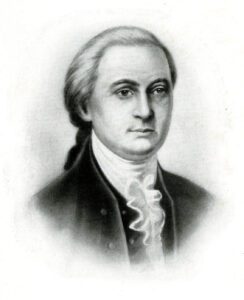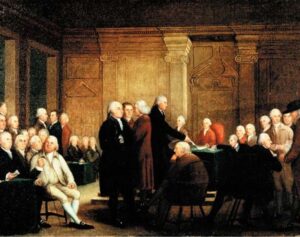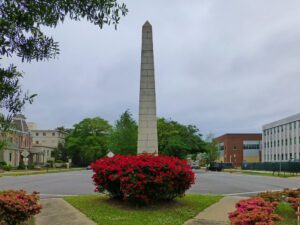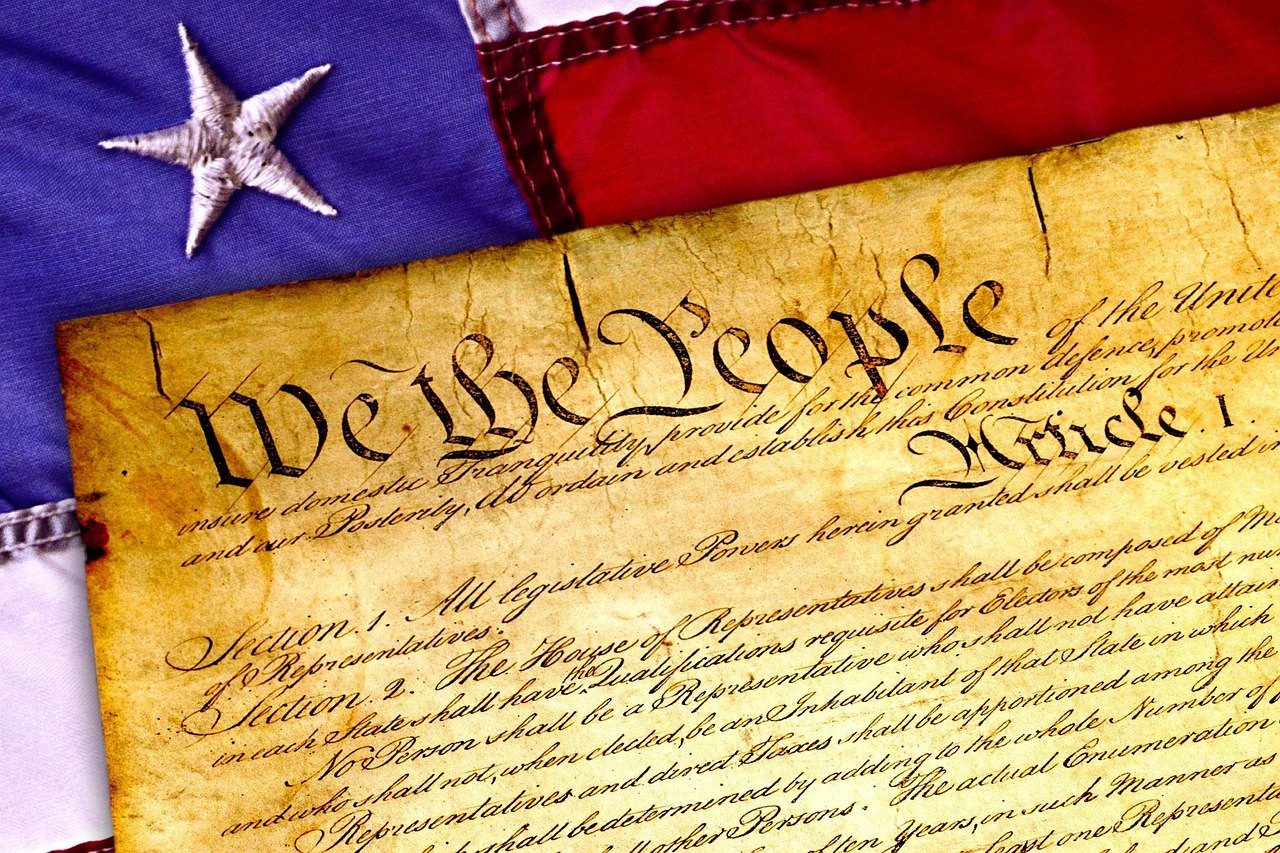
George Walton is another signer of the Declaration of Independence that overcame humble and difficult origins to become a successful lawyer and politician and a Founding Father. He was an ardent and early proponent of Independence, and he backed up his words with action by serving in combat. He was wounded and captured by the British until being released in a prisoner exchange eight months later. Walton represented his adopted home of Georgia at both the state and federal level.
The childhood of George Walton is not well documented, and dates used by historians vary as much as ten years.
George Walton was one of three or four children born to Robert and Mary Hughes Walton during the 1740’s in Cumberland County, Province of Virginia. His family was poor and both parents died when he was between 7 and 12 years old. He was raised by his uncle, also named George Walton, of Prince Edward County, Virginia, who oversaw his welfare until he was apprenticed to a carpenter. His uncle did not let George read books because he saw it as a waste of time.
The master carpenter worked George hard during the day. George wanted to educate himself, but the master denied him a candle to use for reading at night. Walton collected lightwood to burn in place of a candle and read as much as possible.
The master carpenter eventually became impressed by Walton’s perseverance and allowed him to keep some of the wages from some of his work. His apprenticeship expired in 1769 and George saw the Province of Georgia as a land of opportunity where he could succeed using his intellect, which had developed considerably because of his self-study.
George Walton did not have an easy early life and he had to overcome many obstacles. He had to physically work hard, and to mentally work hard to educate himself. He also had to overcome the prejudice of those who did not believe that an orphaned carpenter could succeed in a world that often required family connections in the seats of power. He overcame it all with his grit and determination. His personality traits, good and bad, were molded by his battles, and this is a good place to summarize them:
George Walton was a short, handsome, and personable man who was proud and often quite arrogant. He was dignified and stern and had a violent temper. However, he was warm to his friends. He was a politician who kept his promises. Walton was passionate, particularly in the cause of liberty. His zeal for liberty allowed him to rise to higher prominence and to secure more public favor and confidence, than he would have otherwise. He tended to be a “nitpicker” and was sometimes sarcastic beyond the rules of propriety. Walton was often contemptuous of public opinion, especially when it differed from his own.

Georgia, established in 1733 by James Oglethorpe and a small group of settlers, was the newest and last British colony in North America. King George II originally intended for the colony’s settlers to be the “worthy poor” from debtor prisons, but economic realities overruled social engineering. However, the King granted no large land grants, and each man was required to work his own land. Slavery and rum were banned.
Most of the rules changed when Oglethorpe returned to England ten years later. He had made peace with the local Indians, but an aggressive Spanish Florida bordered on the south. Although the colony was developing, large-scale settlement did not begin until the end of the French and Indian War in 1763 when the English acquired Florida and the Spanish threat ended.
After moving to Georgia in 1769, George Walton saw his self-study pay off and he entered the Savannah office of Lawyer Henry Young to study law. In 1774, he was admitted to the bar and established his own practice in Savannah. Determined to succeed, George rapidly became one of the most successful lawyers in Georgia.
George Walton married Dorothy Camber in Savannah in 1775 (some historians say 1778). Dorothy was born in 1754 in Chatham County, Georgia, the daughter of Thomas and Dorothy Camber. Dorothy was a teenaged girl, attractive, poised, with the dignity and decorum of a well-bred British woman. She was mature, had a fine mind, had a great capacity for love and loyalty, and was capable of firm decisions.
Thomas Camber was a large landowner and was loyal to the Crown, and to him George Walton was a traitor. He forbade Dorothy’s relationship with Walton, but this did not stop their courtship and marriage.
When the Revolutionary War broke out, Dorothy’s father was returning to England and insisted that she go with him, but she refused to leave George.
George and Dorothy had two sons that both lived to adulthood.
The English King and Parliament was exercising much more direct and intrusive control of their colonies in North America and Americans in other provinces were actively resisting. George Walton was already an ardent advocate of independence and he and other local patriots began organizing to preserve their rights and liberties. They began by cooperating with patriots in other provinces. They also reached out to patriot groups in other Georgia parishes, and they formed the Georgia Provincial Congress in 1775.
Walton was appointed Secretary of the congress and President of the Council of Safety. However, the people of Georgia were lukewarm to independence at best, and not ready to resist the Crown. As a result, the congress did not send delegates to the First Continental Congress in Philadelphia, Pennsylvania. Georgia was the only colony not represented.
Finally, in the winter of 1776, Georgians began to avidly support resistance to the Crown, and the Georgia Assembly openly declared for the patriot cause. In February, the Assembly appointed delegates to the Second Continental Congress. George Walton was one of the four appointed.
The Royal Governor of Georgia was incensed by the Assembly’s “treasonable act” and threatened to use military force against them. The Assembly simply ignored the Governor and continued to establish a new government. Archibald Bulloch was named President of the new government’s Executive Council, which made him the first elected Governor of the Province.

George Walton was elected to the Continental Congress in February 1776, but may not have arrived in Philadelphia until June. He joined the Congress and declared his support for separation from England. He voted for independence on 2 July and on the final version of the Declaration of Independence on 4 July 1776. The Georgia delegation (George Walton, Button Gwinnett, and Lyman Hall) signed the Declaration of Independence on 2 August 1776 as did most delegates.
In October 1776, Walton was re-elected to the Continental Congress. He served as a delegate until the end of 1778.
In December 1776, British forces threatened Philadelphia causing Congress to flee to Baltimore, Maryland. George Walton, Robert Morris, and George Clymer remained behind to carry on essential congressional business. The enemy withdrew without attacking Philadelphia, so Congress returned in February 1777.
In December 1778, George Walton was commissioned Colonel of the Georgia militia. He then traveled south and took part in the first Battle of Savannah.
On 29 December1778, British Lieutenant Colonel Archibald Campbell and his force of between 2,500 and 3,600 troops, launched a surprise attack on American forces defending Savannah. American Major General Robert Howe and his force of 650 to 900 men were severely outnumbered.
Campbell outflanked the Continental forces and Howe ordered his army to withdraw. During the withdrawal, the Georgia Brigade took heavy losses when it was cut off. They suffered 83 casualties and another 483 were captured. During the fighting Colonel Walton was shot in the thigh causing him to fall from his horse. He was taken prisoner by the British and was held until September 1779 when he was exchanged for a British Navy Captain.

After his release, Walton purchased a home in Augusta, Georgia. He also purchased additional adjacent land and named his new home, “Meadow Gardens.”
In October 1779, Walton was appointed Governor of Georgia but resigned in January 1780 because he was elected to Congress for another two years. During this time, Walton was involved in an unsavory incident, which resulted in him being censured by the legislature in 1783.
The incident involved Button Gwinnett and General Lachlan McIntosh. It was a long and personal dispute over command of Georgia troops, political machinations, and a public insult. Walton was a friend of General McIntosh and leader of a group that opposed Gwinnett. George Walton allegedly had sent a forged letter to Congress that had resulted in McIntosh being relieved from his command. He blamed his rival Gwinnett and publicly insulted him. Gwinnett demanded “satisfaction,” and they met on the field of honor. The duel resulted in Gwinnett being mortally wounded by McIntosh who was also wounded.
After the duel and Walton’s censure, General McIntosh’s son, Captain William McIntosh publicly “horse-whipped” Walton and was court-martialed for his actions.
Despite the incident, George Walton’s career continued. In 1783 he was appointed Chief Justice of Georgia, a position he held until his death. Also in1783, he was named one of the Commissioners to negotiate a treaty with the Cherokee Tribe in Tennessee. The resultant treaty established a boundary separating Georgia and Tennessee and the Cherokee tribes. This and most treaties with Indians were “fleeting” because settlers continued to crowd them out of their lands and the Indians retaliated.
In 1789 Walton served as a Presidential Elector and was again elected governor. During his term, the Creek Indians were pacified, a new state constitution was adopted, and the capital was moved to Augusta, which was a small country town. Being a resident of Augusta, Walton took an active part in transforming it from a country village to the new state capital. He helped set up a governing body for the town. He also pushed for adoption of a checkerboard pattern of lots and for the construction of a jail, a courthouse, and a school. Although he had not attended a school, he was a promoter of education. He was a founder of the Richmond Academy High School in Augusta, and he hired the first headmaster. He also managed to have 250 acres on a hill above the town reserved for a college. He campaigned to have the state move Franklin College (later the University of Georgia) to Augusta, but he lost out to Athens. Today the 250 acres are occupied by Augusta College.
Walton was elected to the United States Senate in 1798. He served one year and then retired to private life at Meadow Gardens. However, he did continue his state judicial duties until his death.

During his later years, Walton suffered from frequent and long bouts of gout, which probably caused his health to deteriorate. He died on 2 February 1804 and was buried in Rosney Cemetery located on a nephew’s plantation in Augusta. Later, his body was moved to the stone obelisk memorial to the three Georgia signers of the Declaration of Independence in Augusta. The memorial was dedicated on 4 July 1848. He and Lyman Hall are buried in a crypt below the obelisk. Button Gwinnett was to be buried there too, but his grave has never been found.
George Walton served his nation and his adopted home of Georgia for his entire adult life. He signed the Declaration of Independence, and his name is enshrined on the Signers Monument in Augusta and the signer’s memorial in Washington, DC. George Washington visited George Walton at Meadow Gardens in 1791 and Lafayette visited the Walton family during his 1825 tour of the United States. Walton County, Georgia is named after George Walton as are at least two schools. A bust of Walton is in the Georgia State Capitol Building.
George Walton was an American patriot who participated in the founding and establishment of the United States of America.
